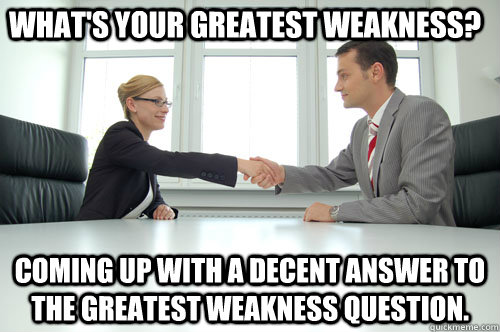You finally got that job interview for the company that you’ve dreamt about working for since you were in high school. You worked hard in college, received your degree and fit all of the qualifications for the job description.
“What’s your biggest weakness?”
This is the unanswerable question. No matter what you say, you will be vulnerable and momentarily weak when you are trying to show the employer you are a strong candidate for their job.
However, there are some ways you can answer questions about your weaknesses and impress your interviewer.
Why Interviewers Ask This Question
Interviewers know you are on your best behavior for the interview. They want to see who will be the best candidate for the future.
The weakness question is meant to throw people off their game. They want to see how people act when they are forced to be vulnerable and honest. They also want to see if you have any character flaws that might negatively impact your job performance or the workplace environment. If you are applying to be a swimming instructor and you blurt out your biggest weakness is you can’t swim, then they know not to hire you.
Be Realistic
“My biggest weakness is that sometimes I work way too hard.”
Please, do not give this answer. Many people will tell you take a strength of yours and flip it into a weakness. While this sounds like a good idea, you have to remember you aren’t being interviewed by a robot.
The interviewer has heard these answers before and can immediately detect if you’re giving some phony answer. An answer that gives a fake weakness is a slap in the face to the interviewer, and they will remember this when they are going through the list of candidates to hire. If your biggest weakness is indeed that you are a perfectionist, be sure to actually share the weakness: “Sometimes, I have a hard time stopping at good-enough and spend too much time perfecting the little details.”
Don’t Give a Job-Related Answer
Don’t give a weakness that will make you seem unqualified for the job.
If you want a job as a surgeon, you probably shouldn’t say your biggest weakness is that you crumble under pressure. If you actually do crumble under pressure, then you shouldn’t be a surgeon.
Make sure your weakness is something that wouldn’t impact your job performance. Don’t say you procrastinate or sleep in late. These are bad traits for any employee.
Your answer should be something that you are weaker at when a certain situation takes place. If you say, “I get stressed out,” this implies you are always stressed. If you say, “I get stressed out when my inbox is full,” then the interviewer knows it’s just certain situations that stress you out. This looks much better.
Reinstate Your Qualifications
The weakness question is always an uncomfortable question to answer because you spend the entire interview trying to get the interviewer to see you as a strong, dependable employee, and then you have to be vulnerable for a few moments.
If you are afraid this question won’t make you look strong, reinstate your qualifications after you give your weakness. Let the interviewer know that, despite your weakness, your qualifications fit the job description.
You should also state how you have diminished your weakness. Interviewers like it when you give a specific example.
Use the STAR Technique
Remember to use the STAR technique during your interview.
STAR stands for Situation, Task, Action and Result. You should start your answer by giving a situation you were in, how you took action to respond to that situation, and the result of what you did. I’ve found that a variation of this, STARR, works even better. The extra step is for reflection: Reflecting on what you did well, what could have been done better, and what you’ve learned.
We love stories. For whatever reason, our minds are designed to take in and interpret stories. You should take a generic, boring interview answer and turn it into a story. The interviewer will be more entertained and they will remember you when choosing whom to hire.
You can use the STARR technique to give your weakness answer. State your biggest weakness and tell a story about how you conquered that weakness. Describe what you normally would’ve done when responding to the situation that stimulates your weakness, and then tell a story where you did something differently and had a much better result.
The STARR technique is great for any answer in your interview.
Don’t Panic
This question gets asked in every interview, and the interviewer knows you will be nervous to answer it. The worst thing you can do is panic and answer the question dishonestly. Take a deep breath, and answer it with the same level of confidence you have been showing for the entire interview.
Keeping these tips in mind during your next interview will help you answer the dreaded weakness question while still making a good impression on the interviewer.

